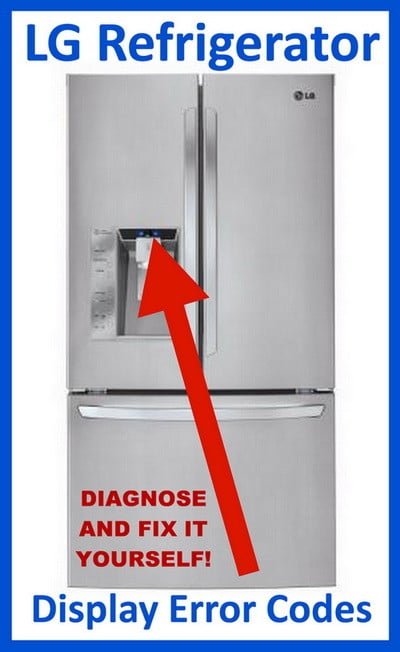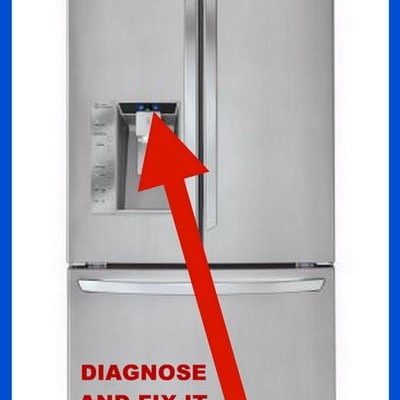
In the realm of home appliances, error codes are like a foreign language. They’re the appliances’ way of communicating that something’s amiss. For your LG refrigerator, the HE error code is a specific signal that highlights an issue with the unit’s heating element. Yes, you heard that right! Some refrigerators have heating elements, primarily to prevent frost build-up, which can be akin to having a well-functioning windshield defroster in your car on a frosty morning. But what happens when this heating element fails? Can the problem be brushed aside? Spoiler alert: ignoring it might not be the best move.
Understanding the Significance of Error Code HE
First things first, what does this HE error code really mean? The “HE” stands for heater error, and it indicates a problem with the refrigerator’s defrosting mechanism. Think of it like this: if your refrigerator is a well-oiled machine, the defrost system is one of its crucial gears. When it falters, your fridge may not be able to regulate frost, which can start a domino effect of issues.
Imagine your kitchen sink: if the drain is blocked, water begins to accumulate. Similarly, without a functioning defrost system, frost can build up within the appliance, potentially leading to larger problems like inefficient cooling, increased energy usage, or, worse, damage to other components. So, even though it seems like just another beep or blip, the HE error is a call to action that deserves attention.
Now, you might be tempted to postpone addressing this error. After all, who hasn’t pushed off a car oil change or a home air filter replacement? But remember, ignoring these seemingly minor issues can lead to bigger, more expensive repairs down the line. With refrigerators, it’s no different. Addressing the HE error promptly can save you from a freezer full of spoiled groceries or a costly service call.
Why You Shouldn’t Ignore the HE Error Code
Ignoring the HE error code is like choosing to drive with a flat tire. Sure, you might get a few more miles down the road, but eventually, it’s going to catch up with you. The same principle applies here. By pretending your refrigerator’s warning doesn’t exist, you risk turning a manageable fix into a full-blown repair bill.
So, what could be causing this error? The culprit could be a malfunctioning defrost heater or a problematic sensor. Think of a misfiring sensor like a faulty thermostat at home; when it doesn’t sense temperatures correctly, it can’t tell your heating or cooling system what to do. Likewise, in your fridge, if the sensor can’t detect frost accumulation properly, the entire defrost cycle can become compromised, leading to that HE error.
Additionally, ignoring this error might result in other subtle yet noticeable effects. You may find your refrigerator running longer to maintain the same coolness, which could spike your energy bills. Or, you might discover your ice cream turning into an unexpected slushy, thanks to inconsistent freezer temperatures. In essence, a small oversight can ripple into larger inconveniences and expenses.
How can you address the issue? The best first step is to consult your refrigerator’s user manual for troubleshooting tips. Manuals often offer basic advice, like ensuring nothing is blocking the unit’s airflow or resetting the appliance. If these steps don’t resolve the issue, reaching out to an appliance repair professional might be necessary to diagnose and fix the problem.
Preventative Measures to Avoid Future Errors
Here’s the deal: prevention is key to avoiding undue stress and costly repairs. Regular maintenance keeps your appliances running smoothly, much like routine car checks keep your vehicle road-ready. But what does this look like for a refrigerator?
Start by maintaining a clean, organized fridge. Overcrowding can block airflow, causing the unit to work harder. Picture a crowded highway where traffic barely moves—your refrigerator functions similarly under duress. Also, ensure your fridge’s temperature settings are correct. If it’s too cold, frost builds up faster, potentially triggering that pesky HE error.
Regularly inspect seals and gaskets for wear and tear. They’re like the weather stripping on your windows; if faulty, they let outside air in, disrupting the internal climate and forcing your fridge to overcompensate. Replacing these seals timely is an easy fix that prevents bigger headaches.
Finally, make it a habit to defrost your freezer annually. This might seem like an old-fashioned chore, but it helps keep frost in check. Modern frost-free fridges make this easier, but a little manual intervention now and then ensures everything stays in tip-top shape. Taking these preventative steps is like giving your fridge a regular check-up—a little effort now means fewer worries later.
Final Thoughts
You might be wondering, “Isn’t it all just a bit much for a fridge?” In reality, modern refrigerators are more than just boxes that keep things cold. They’re complex systems that require care and attention to function efficiently. So, while ignoring the HE error might seem like an easy route, the smarter choice is to tackle the issue head-on.
Remember, dealing with this error now isn’t just about fixing a problem—it’s about investing in the longevity of your appliance. After all, isn’t it better to address a small hiccup today than face a major breakdown tomorrow? It’s a bit like choosing to eat that apple a day to keep the doctor away. So, heed the warnings, take action, and keep your refrigerator humming along happily for years to come.
